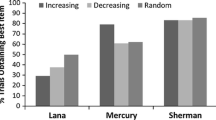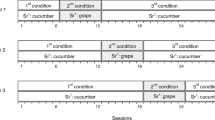Abstract
To assess how brown capuchin monkeys (Cebus apella) delay gratification and maximize payoff, we carried out four experiments in which six subjects could exchange food pieces with a human experimenter. The pieces differed either in quality or quantity. In qualitative exchanges, all subjects gave a piece of food to receive another of higher value. When the difference of value between the rewards to be returned and those expected was higher, subjects performed better. Only two subjects refrained from nibbling the piece of food before returning it. All subjects performed two or three qualitative exchanges in succession to obtain a given reward. In quantitative exchanges, three subjects returned a food item to obtain a bigger one, but two of them nibbled the item before returning it. Individual differences were marked. Subjects had some difficulties when the food to be returned was similar or equal in quality to that expected.



Similar content being viewed by others
References
Anderson JR (1996) Chimpanzees and capuchin monkeys: comparative cognition. In: Russon AE, Bard KA, Parker ST (eds) Reaching into thought: the minds of the great apes. Cambridge University Press, Cambridge, pp 22–56
Anderson JR (2001) Self-control and other-control in squirrel monkeys. In: Matsuzawa T (ed) Primate origins of human cognition and behavior. Springer, Berlin Heidelberg Tokyo, pp 330–348
Anderson JR (2002) Tool-use, manipulation and cognition in capuchin monkeys (Cebus). In: Harcourt CS, Sherwood BR (eds) New perspectives in primate evolution and behaviour. Westbury, Otley, UK, pp 127–146
Beran MJ, Savage-Rumbaugh ES, Pate JL, Rumbaugh DM (1999) Delay of gratification in chimpanzees (Pan troglodytes). Dev Psychobiol 34:119–127
Bertrand M (1976) Acquisition by a pigtail macaque of behavior patterns beyond the natural repertoire of the species. Z Tierpsychol 42:139–169
Boysen ST (1997) Representation of quantities by apes. Adv Stud Behav 26:435–462
Brosnan SF, de Waal FBM (2003) Monkeys reject unequal pay. Nature 425:297–299
Brosnan S, de Waal F (2004) A concept of value during experimental exchange in brown capuchins monkeys, Cebus apella. Folia Primatol 75:317–330
Chalmeau R, Peignot P (1998) Exchange of objects between human and captive western lowland gorillas. Primates 39:389–398
Coussi-Korbel S (1993) Influences sociales sur l’acquisition et l’utilisation d’informations relatives à la recherche de nourriture dans un groupe de cercocèbes (Cercocebus t torquatus). PhD thesis, Université de Rennes 1
de Vries H, Netto WJ, Hanegraaf PLH (1993) Matman: a program for the analysis of sociometric matrices and behavioural transition matrices. Behaviour 125:157–175
de Waal FBM (1989) Food sharing and reciprocal obligations in chimpanzees. J Hum Evol 18:433–459
de Waal FBM (1997a) The chimpanzee’s service economy: food for grooming. Evol Hum Behav 18:375–386
de Waal FBM (1997b) Food transfers through mesh in brown capuchins. J Comp Psychol 111:370–378
de Waal FBM (2000) Attitudinal reciprocity in food sharing among brown capuchin monkeys. Anim Behav 60:253–261
de Waal FBM, Berger ML (2000) Payment for labour in monkeys. Nature 404:563
de Waal FBM, Luttrell LM (1988) Mechanisms of social reciprocity in three primate species: symmetrical relationship characteristics or cognition? Ethol Sociobiol 9:101–118
de Waal FBM, Luttrell LM, Canfield ME (1993) Preliminary data on voluntary food sharing in brown capuchin monkeys. Am J Primatol 29:73–78
Feistner ATC, McGrew WC (1989) Food sharing in primates: a critical review. In: Seth P, Seth S (eds) Perspectives in primate biology. Today and Tomorrow’s Press, New Delhi, pp 21–36
Fragaszy DM, Feuerstein JM, Mitra D (1997) Transfers of food from adults to infants in tufted capuchins (Cebus apella). J Comp Psychol 111:194–200
Hemelrijk CK (1996) Reciprocation in apes: from complex cognition to self-structuring. In: McGrew WC, Marchant LF, Nishida T (eds) Great apes societies. Cambridge University Press, Cambridge, pp 185–195
Hyatt CW, Hopkins WD (1998) Interspecies object exchange: bartering in apes? Behav Proc 42:177–187
Kummer H, Cords M (1991) Cues of ownership on long-tailed macaques, Macaca fascicularis. Anim Behav 42:529–549
Lefebvre L (1982) Food exchange strategies in an infant chimpanzee. J Hum Evol 11:195–204
Lefebvre L, Hewitt TA (1986) Food exchange in captive chimpanzees. In: Taub DM, King FA (eds) Current perspectives in primate social dynamics. Van Nostrand Reinhold, New York, pp 476–486
Logue AW (1988) Research on self-control: an integrative framework. Behav Brain Sci 11:665–709
Manson JH, Rose LM, Perry S, Gros-Louis J (1999) Dynamics of female–female relationships in wild Cebus capucinus: data from two Costa Rican sites. Int J Primatol 20:679–706
Marshall A (1920) Principles of economics. Macmillan, London
Mauss M (1924) Essai sur le don, forme archaïque de l’échange. Annèe Sociologique 1:30–186
Mischel W (1974) Processes in delay of gratification. In: Berkowitz L (ed) Advances in experimental social psychology, vol 7. Academic Press, New York, pp 249–292
Noë R, Hooff JARAM van, Hammerstein P (2001) Economics in nature. Cambridge University Press, Cambridge
Perry S, Rose L (1994) Begging and transfer of coati meat by white-faced capuchin monkeys, Cebus capucinus. Primates 35:409–415
Sahlins M (1972) Stone age economics. Aldine, Chicago
Savage-Rumbaugh ES, Rumbaugh D, Boysen S (1978) Linguistically mediated tool use and exchange by chimpanzees (Pan troglodytes). Behav Brain Sci 4:539–554
Seyfarth RM (1980) The distribution of grooming, and related behaviours among adult female vervet monkeys. Anim Behav 28:798–813
Seyfarth RM, Cheney DL (1988) Empirical tests of reciprocity theory: problems in assessment. Ethol Sociobiol 9:181–187
Sousa C, Matsuzawa T (2001) The use of tokens as rewards and tools by chimpanzees (Pan troglodytes). Anim Cogn 4:213–221
Szalda-Petree A, Craft BB, Martin LM, Deditius-Island HK (2004) Self-control in rhesus macaques (Macaca mulatta): controlling for diffrential stimulus exposure. Percept Mot Skills 98:141–146
Thierry B, Wunderlich D, Gueth C (1989) Possession and transfer of objects in a group of brown capuchins (Cebus apella). Behaviour 110:294–304
Tobin H, Logue AW, Chelonis JJ, Ackerman KT, May JG (1996) Self-control in the monkey Macaca fascicularis. Anim Learn Behav 24:168–174
Tomasello M, Call J (1997) Primate cognition. Oxford University Press, Oxford
Visalberghi E, Limongelli L (1996) Acting and understanding: tool use revisited through the minds of capuchin monkeys. In: Russon AE, Bard KA, Parker ST (eds) Reaching into thought. Cambridge University Press, Cambridge, pp 57–79
Westergaard GC, Suomi SJ (1997) Transfer of tools and food between groups of tufted capuchins (Cebus apella). Am J Primatol 43:33–41
Westergaard GC, Liv C, Chavanne TJ, Suomi SJ (1997) Token-mediated tool-use by a tufted capuchin monkey (Cebus apella). Anim Cogn 1:101–106
Westergaard GC, Liv C, Rocca AM, Cleveland A, Suomi SJ (2004) Tufted capuchins (Cebus apella) attribute value to foods and tools during voluntary exchanges with humans. Anim Cogn 7:19–24
Acknowledgments
The authors are grateful to A. Bloem, R. Gabarre, C. Grymonprez, P.A. Lydoire, F. Montillot, L. Pichegru, C. Regnier, and B. Renou for assistance with the experiments.
Author information
Authors and Affiliations
Corresponding author
About this article
Cite this article
Drapier, M., Chauvin, C., Dufour, V. et al. Food-exchange with humans in brown capuchin monkeys. Primates 46, 241–248 (2005). https://doi.org/10.1007/s10329-005-0132-1
Received:
Accepted:
Published:
Issue Date:
DOI: https://doi.org/10.1007/s10329-005-0132-1




